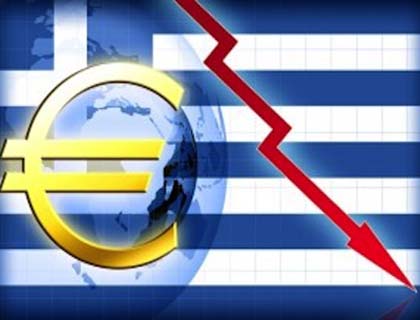The situation in Greece is really turning gruesome as civilians and politicians are sharply divided on austerity policy which is the only way ahead to secure a second 130 billion euro international bailout, and avoid default next month. Greek people are not really ready to go along with the government and bear the brunt of measures which are demanded by creditors and euro fellows.
Hatred against politicians has risen to unprecedented level. The former Prime Minister, Mr. George Papandeuros, reportedly, cannot walk out in the public without bodyguards which looks somehow bizarre in a democratic atmosphere. Same is the case with ruling politicians. People pelt yogurt, eggs and etc to show their anger against their consecutive yielding to demands of international creditors for tightening the circles of economic austerity.
The unemployment rate is increasing moving upward and since the very first time victimized by bullet ran off from the other side of Atlantic, it has never found way back in the country. It currently stands at 19% which is quite similar to undeveloped and poor countries. Many more are in the waiting list to join the unemployed people as both private and public sectors are in terrible situation and unable to generate jobs for laid-offs and youngsters entering to working-age group. Additionally, there are reports about discharging many more civil servants in order to save the revenues by the government. Private sectors too are not in better situation. High taxes, as part of austerity policy put in practice during past four years, have proved back breaking for them as many are unable to pay the salary of their employees.
Poverty is spreading its tentacles and grasping many more people. And those who are already there they are squeezed so hard that they shout and scream for help. Their scream made many to heed and feel sympathy. As an IMF official, the international organization which during years of its dominance in the international finance gained the fame for cruelty and brutality, and against which several famous poets in developing and underdeveloped countries composed poems, has said explicitly that Greece had done a lot.
Reportedly, thousands have become homeless and many home owners are not able to pay their mortgage in due time and would lose house to their loan providers as part of the contract.
Moreover, there are lots of people who have remained unemployed for a long time. Some citizens could run on the savings made during good time before 2008 financial crisis. If the situation remains unchanged which, realistically observing, would, they will soon end up to slumps. So, the prospective is not good at all, and the main guilty factor is high sovereign debt.
The current sovereign debt of the country is around 160% of national gross product, which is quite frightening. International creditors say it should be brought down to 120% by 2020, which looks hard, if not impossible, because the country is run currently on budget deficits which means further debt accumulation even after practicing severe austerity measures.
So, the question is what should be done and what Greece politicians can actually do?
The only thing prescribed by EU and euro currency union is tougher and tougher austerity policies. They are arguing that the budget deficits should decrease remarkably, without consideration to the consequences. The economy has shrunk too much and it is not known when in the future the country becomes able to gain pre-2008 GDP.
Squeezing it further may not produce the intended result. It is like squeezing the nipples of skinny cow to draw milk.
Now Greece politicians do not have choices. There are only two choices in both of which they have to fight hard. If they pass austerity plans again, they will face the brunt of constituents in the upcoming election. If they want to avoid, they have to fight with international creditors and European fellows. Last Sunday, political inexperienced president Mr. L.D. Papademos, the interim president, the former central banker and Harvard Professor, failed to reach an agreement with three ruling political parties' leaders.
Thus, if the government fails to approve austerity plan, it is largely possible that it cannot receive 130 billion euro international bailout money. And private creditors too may not write off their claims. (As part of previous agreement, the private sectors have given loans to Greece government to write off 50% of them, on condition that Greece abides to all its commitments).
So, if the politicians remain divided and cannot pass the austerity law in the coming weeks, the situation will turn truly complicated. If it does not receive the bailout money, it will default, which many economic experts deem as the first and foremost step towards leaving the currency union and going back to drachma, the thing which is not for both fronts.
Greece people are not willing to leave the currency union at all, which according to them, if happens, will cause economic miseries and poverty.
On the other hand, euro members have a lot to lose too. The larger part of sovereign debt is not from domestic financial institutions; rather it has borrowed a lot from euro countries and private financial institutions. If it defaults and leaves the currency union, the larger stack of big euro economies at stack. In another word, the consequence of losing Greece than bailing it out is far greater and larger.
So, from the both sides, there are strong incentives to keep the country in. but the question is how it can be prevented from a possible free-fall on the account of its sovereign debt? One way is passing the austerity law. But if the government cannot do so, then what? Will international bailout money be released? It is too early to say.

